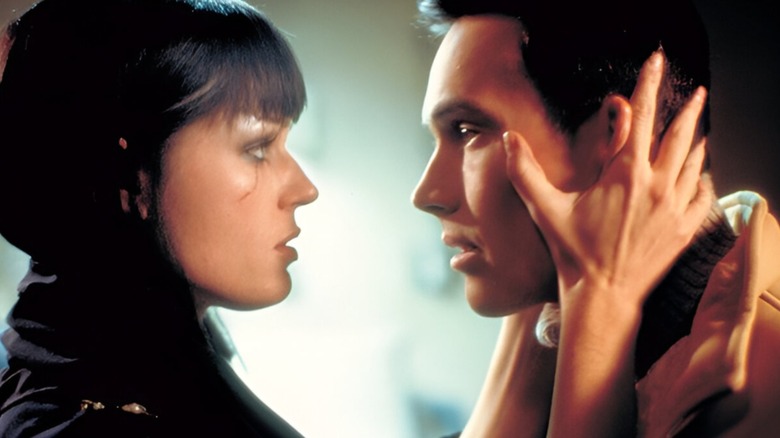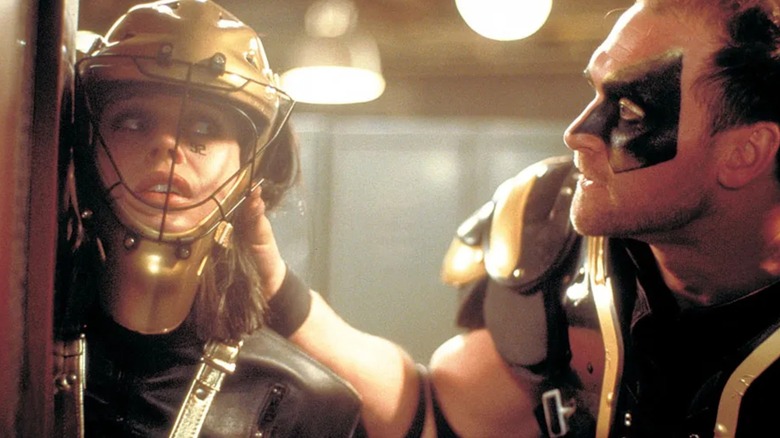
This post contains spoilers for "Rollerball" and its 2002 remake.
50 years have passed since "Rollerball" was released in theaters in 1975, but this sci-fi cult classic still hits hard. If anything, it only
feels more prescient with its near-future setting where corporations rule the world, and where every citizen is considered a customer. This might feel confusing at first, as "Rollerball" is technically a sports movie, where its titular futuristic sport lends the story a certain amount of action-first kineticism. While this is true, Norman Jewison's 1975 classic mounts a flawed social commentary that is scathing in its own way, even though some aspects of the story haven't aged too well and can be deemed exploitative.
The dangerous, corporate-mandated sport of Rollerball is more than just vapid entertainment. It is a tool used to control vastly scattered social classes, disguised as a necessary spectacle that can end conflict and eradicate bigotry at its root. If this sounds like a mid-70s version of "The Hunger Games," that's because it is a revamped version of the battle royale concept that usually comes with a critique of corporate hegemony (or any kind of autocracy). If the Hunger Games are a reminder of the Capitol's corrosive hold over the districts, Rollerball reinforces that every individual effort is futile, squashing the idea of heroism while fostering toxic codependence.
So when Rollerball star player Jonathan E. (a brilliant James Caan) achieves a level of superstardom that is concerning for the state, the corporate executives devise a scheme to keep his global influence under control. However, Jonathan isn't the kind of person to do anyone's bidding or abandon his teammates in a game that he has grown to genuinely love.
Now imagine a modern-day remake of this premise where every satirical component has been completely eliminated in favor of three video game-coded Rollerball tournaments that are all style and no substance. This is how abysmally bad 2002's "Rollerball" is — the film is such a hollow remake of the original that it doesn't even deserve a one-time ironic viewing. It is also among IMDb's lowest-rated movies. Let's talk about it!
Read more: The 15 Best Sequels To Bad Movies
The 2002 Rollerball Remake Is A Ghoulish Cash-Grab Devoid Of Soul

John McTiernan (who has directed bangers like "Die Hard" and "Predator") fundamentally misunderstood the appeal of a "Rollerball" remake, as he made several baffling changes to the script after coming onboard. The initial script for the film was more than decent: it recontextualized the original's social commentary while ensuring that the central success story underlined human perseverance and the collective impulse to challenge tyranny. However, McTiernan wanted none of that, so he had the script rewritten several times with the focus shifting to a WWE-style tournament system with an over-the-top visual style. The result was a nonsensical underdog story that didn't mesh with the grander worldbuilding at all, made worse by an incoherent editing style that can genuinely induce nausea.
Now, you might be wondering: It can't be that bad, right? I mean, yes, the film does have a frightening 3% Rotten Tomatoes score, but even the worst film ever made has some redeeming qualities, right? Well, "Rollerball" wouldn't have felt so insultingly ghoulish if it were just a shoddily-made film; its fault lies in its hollow center, as it wants to ride on the coattails of its predecessor without committing to the commentary that makes the original so timeless. It is also important to note that McTiernan and MGM initially ignored most of the negative feedback provided at test screenings, but chose to re-shoot a chunk of the story close to its initial 2001 release date (which was eventually pushed back to February 2002). As a result, the already weak narrative was shuffled around to form something even more muddled, with much of the R-rated violence and nudity cut down to a great extent.
I don't have much to say about the story that 2002's "Rollerball" plays around with, as there isn't much substance to warrant discussion. In this iteration, Jonathan (Chris Klein) skateboards recklessly down hills and spends most of his time giving backhanded compliments to his love interest, Aurora (Rebecca Romijn-Stamos). When Jonathan does get involved with Rollerball, you end up wishing he hadn't. These sequences are glossy, frenetic, and filled with disorienting close-ups, but you can barely make out what is happening onscreen, which is never a good sign. I wouldn't recommend this remake to my worst nemesis, but in case you're feeling curious, you're better off revisiting Jewison's "Rollerball" and its intriguing, problematic world.
If you're looking for the easiest way to keep up with all the major movie and TV news, why not sign up to our free newsletter?
Read the original article on SlashFilm.












